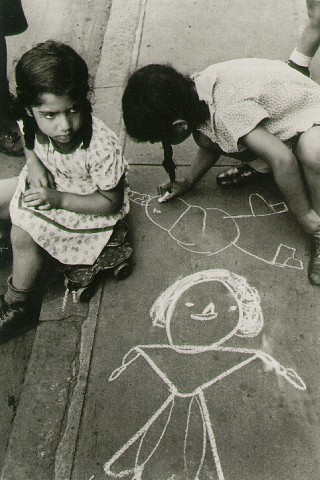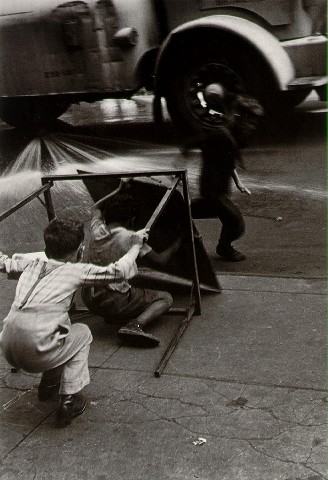T.S. Eliot - A Debate On Creativity?
“Streets that follow like a tedious argument...Of insidious intent”
The following statements regarding T.S. Eliot's Tradition and the Individual Talent were unfortunately posted on the internet. They are given below along with the appropriate mockery and refutation.

Amanda S. Campbell; Eliot's View of Emotion and Personality
In "Tradition and the Individual Talent," T.S. Eliot describes the basis for what poetry is in anway that seems unappropriate when applied to most writers. "Poetry is not a turning loose of emotion, but an escape from emotion; it is not the expression of personality, but an escape from personality." (470) His theory implies that poets only write to remove themselves from their day to day emotions. Eliot says that emotion has nothing to do with a poet's work.
If you consider for a moment someone who writes a poem about his or her deep love or infatuation for another person. What the writer does is transform these profound emotions into words. Should this not be considered poetry because the writer feels strongly about what he is working on? In Eliot's theory, raw emotion transformed into verse is not considered poetry. The thoughts in Eliot's essay hardly apply to the "romantic poet."1
Personality applies strongly to the emotions of a person, and is also something that the poet is escaping from in Eliot's essay. When a person writes something, whether it is poetry or a novel, elements of the writer's personality is more likey to be enhanced. Poetry is literature that links the reader to the true personality of the author.2
Eliot's description of what poetry is in his essay is simply not general enough.3 Instead, he focuses on those who want to be removed from it, and as a result, describes something that does not seem to be art.

Mockery and Refutation
1 Correction: romantic poems offer some of the most painful reading experiences one could have. And why? I don't like poems written in love, because they just don't speak wisdom. The afflicted poet writes a poem to try to make reality conform to his ill-formed desires. If he can't have her in the sheets, he can at least have her on paper. [Excerpt from bad romantic poem] "She is the fairest, hair white as a white lace thing. I love her. I would never cheat on her, I swear." On the other hand, here is an excerpt from a so-called non-romantic poem: "Yeah, we're both hot for each other. It's lucky we have a lot in common besides just that. Otherwise, it would be harder." Now that was an honest love poem. More honest love poems I've enjoyed are "I only hit her once" and "I love it when you're close to me, just not that close."
2 I can't even understand this paragraph let alone make fun of it.
3 Amanda's favorite definition of what poetry is: words on paper.
It is certainly true that the artist should have great personal fervor. Indeed, he should have an inappropriate relationship with that woman. But simply being infatuated with another person is not sufficient. Rather, one must temporarily transcend one’s own personal sphere in order to achieve artistic focus. Thus, it is the momentary recovery from or at least sublimation of these passions that will produce great works. By far the most worthless poem I ever wrote was an attempt to express my feelings for a young maiden (poem not shown here).
Joan Baptiste; T.S. Eliot (only spelling has been corrected)
T.S. Eliot's philosophical discourse on the arts and poetry is an intriguing attempt to define the source of creativity, the demands placed on an artist, and the elements necessary for the process of poetry to be valid. While any literary criticism serves the purpose of clarifying or defining standards of excellence, it also risks limiting expression into such a narrow definition, that artists who don't conform to the critics' formula are categorized as lesser talents and Eliot's critique is no exception. It seems that for each elevating idea that he presents, such as the continuum of poets and poetry working in a perfect order of tradition, he also states subjective, opinionated ideas that cannot be confirmed. For instance, his idea that a poet should learn as much as he can but not to the point that he becomes deadened to the world is impossible to validate.1 The problems with this reasoning are as many and varied as there are subjects that run the risk of dulling rather than enhancing one's inspiration for creativity.2 How much and what type of knowledge is too much? Is one mind as susceptible to being overwhelmed as another? Although it appears that he gives a great deal of thought to developing some of his ideas, others are given only cursory amount of attention and do not stand up to examination.
Eliot manifested these imbalances in himself and his works.3 It must have been comforting to subscribe to the idea that one was not only standing with giants by placing one's work in the stream of tradition, but also influencing the way those past works were viewed by the incorporation of a new work that in turn paid homage to past writers.
4 The ex-patriot group of American writers that first found acceptance in England, Eliot's adopted home, gathered together to reaffirm the worth of their works in view of his critique. It seemed to give credibility to those such as Robert Frost who had been ignored in his home country. Others, such as William Carlos Williams, looked at the philosophy that was offered as the defining statement of poetry and set off in his own unique style. Although he was a learned man, a doctor or medicine as opposed to Eliot's studies in philosophy, his depictions of simple, every day objects allowed clear, uncluttered images to stand on their own merit. An urn didn't have to be Grecian, it could just be an urn. Eliot, on the other hand, wrote works that require half of the page to be notes explaining what his vague and mysterious images refer to. If his poems are the result of tradition's influence on an individual, it appears that this definition of true creativity puts it beyond the reach of all but the most devoted and learned individuals.
Mockery and Refutation (Joan Baptiste's Cool Name Notwithstanding)
1 And just as impossible to invalidate. First, you are taking his argument too seriously.
Second, you really need to read the Chuang Tzu,
as "obviously you still have a lot of underbrush in your head."
2 The problems with this sentence are as many and varied as there are subjects that it runs the risk of dulling rather than enhancing one's ability to remain awake.
3 But remember that ‘inconsistency is the hobgoblin’ of small essay writers.
4 Only Hemingway is allowed to write a sentence that long, C -
You have to understand the difference between artist and audience. It is the artist’s job to know a lot about his subject. Zen monks would study for a lifetime before reaching the understanding necessary to produce great ink monochrome Michael Jordan didn't just fall off a log and start making fadeaway jump shots to win championships, and neither did any great poet. Why Robert Frost logged countless hours of intense finger exercises every day for ten years before he was able to write “The Road Not Taken.” This is the business of great artists—they understand it so well that they make it look easy. On the other hand, Eliot's argument says nothing about enjoying great art.
“That might be the best approach for anyone seeing the film
for the first time: to set aside the labyrinthine plot, and simply admire what is on the screen.”
Great art can appeal on both an immediate (primary response) and intellectual (scholarly dissection) level. At this point,
I prefer reading Eliot poems without the footnotes. I'm not really sure if it's that I don't have time to worry about the footnotes or that I just don't care. Nonetheless, I got a week's pleasure from the imagery alone in Preludes. The images and word spice in Eliot's poems are so instantly rich, powerful and rewarding that I must hold him in the highest regard alongside Robert Frost and possibly even Jesse Ventura. Seriously, did you hear his last speech? Incredible. These works are as compelling as smoked duck and as frightening as Madelaine Albright. For the non-professional, it might be better to enjoy them at face value for now, under the pretense of taking them up again later for further deliberation.
“Oh, do not ask, ‘What is it?’
Let us go and make our visit.
<!——— timeless joke maker version 10.3———!>
<SCRIPT>
time = every 6 months; run evaluatereference.exe; replace "madelaine alibright" with searchresult 1; run lookup.exe : altavista : searchvalue=1; searchvalue "1" = "washington + warhawk + psychopath + famous + government" if searchresult 1 equals "george bush" then run lookup.exe : infoseek : searchvalue=1>
</SCRIPT>
T.S. Eliot Poems
Other Poetry
Art & Lit
Home

